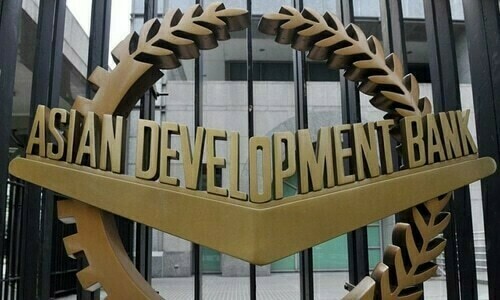
• Minister says Israeli strikes killed 51 people in a day
• International Organisation for Migration estimates nearly 100,000 displaced so far
• Pakistan tells its citizens to leave the country or relocate to safe areas
BEIRUT: Israel widened its airstrikes in Lebanon on Wednesday and shot down a ballistic missile that Lebanon’s resistance movement Hezbollah said it had fired at the Mossad spy service headquarters near Tel Aviv, ratcheting up the conflict between the two arch-foes.
The Israeli airstrikes killed 51 people and wounded 223, the Lebanese health minister Firass Abiad told a press conference on Wednesday.
Hezbollah announced in a statement on Wednesday that it has struck a Mossad headquarters in the suburbs of Tel Aviv with a Qader 1 ballistic missile.
“In support of our defiant Palestinian people in the Gaza Strip and as part of backing its daring and honorable Resistance, and in defense of Lebanon and its people, the Islamic Resistance fighters targeted on Wednesday, September 25, 2024 at 6:30 a.m. the Mossad headquarters in the suburbs of Tel Aviv with a ‘Qader 1’ ballistic missile,” the statement said.
“This headquarters is responsible for assassinating Hezbollah leaders and blowing up pagers as well as the wireless devices,” it said, accusing the Israeli spy agency of carrying out an operation last week in which booby-trapped pagers and radios of Hezbollah members exploded, killing 39 people and wounding nearly 3,000.
The missile attack triggered sirens in Tel Aviv as well as multiple other towns in the central Israeli territories, with Israeli media reports declining to provide details on the extent of damage and the number of casualties.
The Wednesday strike marks the first time Hezbollah has used a long-range ballistic missile in the near-daily conflict with Israel.
Civilians flee Israeli attacks
Hundreds of thousands of Lebanese have fled their homes and hospitals have filled with the wounded since an intensification of bombing on Monday, when more than 550 people were killed in Lebanon’s deadliest day since the end of a 1975-1990 civil war.
White House national security spokesperson John Kirby said the United States was deeply concerned by the reports of a ballistic missile attack aimed at Mossad headquarters in Tel Aviv, but it still believed a diplomatic solution could be found to ease the violence.
Israel has expanded the areas it has been striking since Tuesday night in Lebanon, with attacks for the first time on the beach resort town of Jiyyeh just south of Beirut and Maaysrah.
The strikes also took place in Bint Jbeil, Tebnin and Ain Qana in the south, the village of Joun in the Chouf district near the southern city of Sidon, and Maaysrah in northern Keserwan district.
Israeli authorities said the Galilee region of northern Israel was hit by heavy Hezbollah barrages on Wednesday morning.
In one salvo about 40 rockets were fired. Some were intercepted in mid-air, others struck open areas or penetrated air defences into populated areas, they said.
Near-daily exchanges of fire in the Israel-Lebanon border area started after war broke out last October between Israel and the Palestinian group Hamas in the Gaza Strip on Israel’s southern border, with Hezbollah saying it was acting in solidarity with its ally Hamas.
Tens of thousands of Israelis have been evacuated from their homes near the border, and the Israeli government has made their safe return an aim of the war, setting the stage for a long conflict. Hezbollah has said it will not back down until Israel ends its war in Gaza.
UN says 90,000 displaced
The United Nations said Wednesday that some 90,000 people had been displaced in Lebanon this week, as Israel pounds what it claims are Hezbollah targets across the country and the Lebanese resistance group attacks Israel.
Since Monday, the UN’s International Organization for Migration has recorded “90,530 newly displaced persons”, a statement said.
Human Rights Watch warned on Wednesday that Israeli strikes on Lebanon were putting civilians “at grave risk”, urging an international investigation into hostilities in the country and in northern Israel.
FO advisory
The Foreign Office (FO) has advised Pakistanis against travelling to Lebanon and urged Pakistani residents in Lebanon to leave the country.
According to a travel advisory issued by the FO, “In view of the recent attacks in Lebanon, Pakistani nationals are strongly advised not to travel to Lebanon until further notice.”
The advisory urged Pakistanis in Lebanon to “travel out through commercial flights which are still available”, adding that if they cannot leave the country, they must “exercise extreme caution and relocate to safe areas”.
The FO urged Pakistanis remaining in Lebanon to remain in contact with the Pakistani embassy in Beirut, attaching contact details to the advisory.
Published in Dawn, September 26th, 2024














































